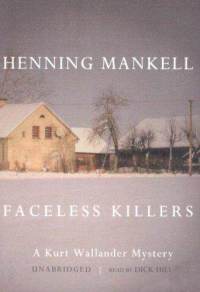
It was a quiet Friday evening in Oslo like many others. Nobody could imagine the huge tragedy was hidden beneath this calm. The stage where each and every year Peace Nobel Prize is given to somebody was going to suffer the explosion of a bomb in its government district, and seven people were going to die. Two hours later, almost a hundred of Norwegian young supporters of the Socialist Party, were going to be cold-blooded killed by a “Christian fundamentalist with a deep hatred of multiculturalism, of the left and of Muslims, who had written disparagingly of prominent Norwegian politicians” according to The Guardian description of the gunman. The killer had been a member of the Progress Party (Fremskrittspartiet), a right-wing assembly and the second political force in Norway at this moment. Hopefully this have been the plot of Inspector Kurt Wallander case, but it haven´t. This was real life, and sometimes, this surpasses fiction.
Scandinavian crime novels and the criticism of the Welfare State
![[millenium fornt covers]](https://rippleeffects.files.wordpress.com/2010/07/millennium-trilogy-stieg-larsson.jpg) What happened in Oslo and Utoya island has been incomprehensible and unexpected. From the point of view of many countries, Norway, and the Scandinavian countries in general, represents the Welfare State in its purest and terrorism and violence seems very remote. Hence new Scandinavian crime novels are so successful. The basis of this is an apparently ideal society criticism where a different problems fail to surface. The reader, not just the Scandinavian reader but any, gets both befuddled and fascinated about the contradiction existing between utopia and reality.
What happened in Oslo and Utoya island has been incomprehensible and unexpected. From the point of view of many countries, Norway, and the Scandinavian countries in general, represents the Welfare State in its purest and terrorism and violence seems very remote. Hence new Scandinavian crime novels are so successful. The basis of this is an apparently ideal society criticism where a different problems fail to surface. The reader, not just the Scandinavian reader but any, gets both befuddled and fascinated about the contradiction existing between utopia and reality.
The American writer Raymond Chandler labeled this genre by its dark atmospheres and the eternal struggle between good and evil where the edges between both are no clear. Its heroes use to be defeated, disappointed with the human race and look for the essence of humanity and a more just society. Let´s see some of the most famous scandinavian crime writers and their characters.
First of all we´ve got Lisbeth Salander, the fascinating main character in Stieg Larsson trilogy Millenium. This tiny and brilliant misfit woman, who probably suffers from the Asperger Syndrome, is the victim of the almighty state that crashes rather than protects her. Besides the three books tribute women and violence against them –the first book is titled “The men that hated women” referring to offenders – sharing readers surprising data such these: 18 per cent of women in Sweden have been menaced once by a man, 46 per cent have suffered violence by men, 13 per cent have been victims of extreme sexual violence out of their relationships, 92 per cent of the women victims of sexual abuse don´t report the police. Beyond the novel, the own Larsson wife suffered this violence in the way of discrimination, since she couldn´t inherit the benefits generated by the books because they never married.
The trilogy, whose first edition was published in 2008, warned about the capitalism excesses and their risks, praised the worth of independent media in a world where money and journalism are mixed, the links with the former USSR and put on the table the Nazi presence in Sweden and the extreme right movements in the country. Hence Larsson never married with his wife, because he investigated them and he was menaced several times, so he was afraid that her name was shown in a record as a result of the marriage and the menace could spread also to his wife.
Problems in “paradise”
 Coming from Sweden too, Henning Mankell –one of the world´s bestselling author-and his antihero Inspector Kurt Wallander, highlights such things as the shock caused in the elderly generation that have lived in a rural and very poor country that nowadays has a high-level standard of living, the pressure from neighboring countries from the former Soviet bloc –human trafficking, sexual exploitation, weapon and drug trafficking-.
Coming from Sweden too, Henning Mankell –one of the world´s bestselling author-and his antihero Inspector Kurt Wallander, highlights such things as the shock caused in the elderly generation that have lived in a rural and very poor country that nowadays has a high-level standard of living, the pressure from neighboring countries from the former Soviet bloc –human trafficking, sexual exploitation, weapon and drug trafficking-.
According to the fiction, politicians in Sweden are not corrupted, unlike in mediterranean crime novels of wich are delightful examples M. Vázquez Montalbán, Lorenzo Silva and Andrea Camilleri, but they do whatever to save their public image. Crime is not such a matter of security as a matter of public image. His fellow citizen Asa Larsson, one of the noir novel queens, underlines the huge pressure of religion in small villages, isolated and surrounded by the wild nature, and a very conservative set of values. This scale of values were also very present in Ingmar Bergman movies.
On the other hand we have Jo Nesbo, a former rock star that has became the most famous Norwegian writer inside and outside his country. The series featured by Inspector Harry Hole draw a small country where everybody is “from two people to know everybody”, quiet, where nothing happens until it happens. In Norway has never existed a serial killer and hence there are no skilled cops in catching these bad guys –only our hero, Harry Hole-. But alcohol and drugs are very serious problems as the dispersion of the population that lives isolated in many cases. In a very small city as Oslo nobody knows anybody. Other main themes in Nesbo novels are the unethical media behavior, the advancement of private initiative and the adequate investment of high taxes that people pay in Norway to keep getting excellent services.
![[book cover-randomhouse]](https://www.unitedexplanations.org/wp-content/uploads/2011/07/www.randomhouse.ca_.gif) In addition to Bjork and its response to the financial crisis, from Iceland comes Arnaldur Indrasson, the “father” of inspector Erlendur Sveinsson. This series outlines a country that has in common with the rest of Sacandinavian countries its past as an agricultural and poor economy, hard weather conditions that carves its inhabitants mood and the geographical dispersion of the population. In this rich society there are misfits, drug and alcohol addicts –the own inspector daughter-, very violent men and very injured women. “This crisis times create a social injustice that encourage illegal activities”, states this author.
In addition to Bjork and its response to the financial crisis, from Iceland comes Arnaldur Indrasson, the “father” of inspector Erlendur Sveinsson. This series outlines a country that has in common with the rest of Sacandinavian countries its past as an agricultural and poor economy, hard weather conditions that carves its inhabitants mood and the geographical dispersion of the population. In this rich society there are misfits, drug and alcohol addicts –the own inspector daughter-, very violent men and very injured women. “This crisis times create a social injustice that encourage illegal activities”, states this author.
These countries are on the top of PISA and UNDP –in this case Norway ranks in the first place- reports but there aren´t perfect. They stopped being agricultural economies and poor investing in technology –for example, Nokia was a family business that became a multinational company with a commitment to bring development and prosperity for Finland- , respecting their environment and paying high taxes to receive excellent welfare benefits.
But they are having problems in their “paradise”, overcoat the pressure of migration flows, that drove Denmark to suspend Schengen Treaty and migration laws previosuly and the rising of extreme right-wing parties. The messages against multiculturalism -supported by the stamenents of such respected political as Angela Merkel and Nicolas Sarcozy about its failure-, Islam, the EU and southern countries have permeated much of this population. Sorrowfully, Anders Behring Breivik´s a product of the reality, not the fiction. If it were so, any of these fictional heroes would had stopped him.
This is a nonprofit explanation.
¿Quieres recibir más explicaciones como esta por email?

